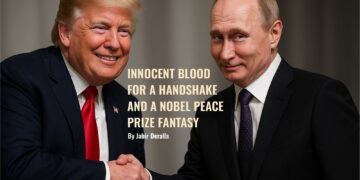By Gudrun Steinacker
“Krivi smo mi” (We are to blame) is the refrain of one of the most famous and probably most important songs by the ‘bard’ Đordše Balašević (1953 – 2021) from 1993, in the middle of the Bosnian war.
We are to blame, Balašević turned accusingly to his compatriots, we have allowed them to hate, shoot and shout: Shoot! Unfortunately, his attempt to wake people up back then failed. Not only the countries of the Western Balkans and their people are to blame for the deplorable situation in the countries of the Western Balkans today, but also the so-called West, especially the EU and its member states, of which Germany is an important player.
In light of the evolving global – or, as it is now more commonly termed, geopolitical – situation shaped by Russia’s full-scale invasion of Ukraine, the war in the Middle East, and Trump’s return to the White House, it is imperative to reassess the situation in the so-called Western Balkans – a term used to describe the group of Southeastern European states that are not (yet) members of the EU. I believe that rapid EU enlargement is an illusion, as the necessary reforms of the EU as an institution are not even on the agenda. A number of articles and books have recently appeared describing the deplorable state of the Balkan region. But no concrete conclusions have been drawn, let alone action taken. Regardless of whether one uses the term hybrid regime or captured state, the outcome is equally bad. Corrupt, kleptocratic elites, even in EU states bordering the WB, are being courted, because it is all about (pseudo) stability at almost any price. “Progress” on the way to EU membership is being evoked, or rather fantasized about. (see also Florian Bieber: Pulverfass Balkan; published: Ch. Links Verlag, 2023) The kleptocrats in all these states ruthlessly pursue their own interests and use the potential of nationalist, ethnic and cultural narratives to divide the inhabitants of their countries: divide and rule!!!
The EU plays a helpless role. Various economic programs, such as the so-called Green Agenda for the Western Balkans, are often ineffective. At the same time, Western actors, governments, parties and companies are still complicit in pursuing short-term interests with the help of kleptocrats. This contributes significantly to the unstable situation.
The writer and journalist, Paul Lendvai, guest speaker at the SOG Annual General Meeting 2019, characterizes “Western” politics as a great hypocrisy in his recent book. It is indeed a combination of hypocrisy, indifference and economic interests in the rediscovered natural resources of the region, whether minerals and metals, hydropower, forests for logging, tourism. “Near shoring” is the motto, especially in Brussels, and they are trying to sell this to the people in the WB states as progress.
Sustainable development is falling by the wayside. Billions disappear into useless and damaging large-scale projects, such as major construction projects like Skopje 2014, Belgrade on the Waterfront, major transport projects, often with Chinese partners, and dubious energy projects with optional Russian, Arab and other partners from authoritarian regimes.
As many civil society actors are dependent on the support of the “West”, they only dare muted opposition.
Russian propaganda incites the Slavic Orthodox population with anti-Western narratives, also in collaboration with the Orthodox churches in the region. The former long-time head of the DPA in Belgrade has demonstrated this in a recent study for the FNS, particularly for Serbia.
Even though many programs and projects funded bilaterally or from EU funds to promote the rule of law and infrastructure are well intentioned, the funds too often end up in the wrong projects and in the wrong hands. Bankwatch has just pointed out that the EU has approved several environmentally damaging projects in the WB6 programs for the energy transition under the Green Agenda.
There are so many more examples…
The most important resource in the Western Balkans is still intact nature, whether mountains, valleys, forests, rivers or mountain pastures. The coasts in Montenegro and Albania have already been largely ruined. Nature is under great pressure due to corrupt and criminal activities. On the other hand, important infrastructure problems remain unsolved despite numerous projects with Western support. Here are just a few examples:
Energy supply with fossil fuels, lignite-fired coal-fired power plants lead to enormous air pollution. Renewable energy projects are often harmful, such as Upper Horizon on the Neretva, or characterized by enormous corruption and criminality (e.g. the Možura wind power plant in Montenegro).
Mining and other forms of extractivism generate profits for corporations and corrupt politicians, while leaving the population to bear the costs – environmental destruction, pollution, and the loss of natural resources.
Inadequate waste and sewage disposal, pollution of rivers, (illegal) deforestation, also fuelled by the rapidly increasing demand for pellets, illegal dredging of river courses, construction of – mainly small – hydropower plants with great damage to biodiversity.
Environmental crime is a rapidly growing and highly dangerous global phenomenon, as highlighted by GI-TOC, Transparency International, OCCRP, and various regional anti-corruption NGOs. This also applies to countries in the EU. In contrast to the Western Balkans, one can hope for a functioning judiciary here. In the Western Balkans, the still large areas of intact environment and nature is in danger of being permanently damaged in the coming years. The destruction of the environment and nature is the destruction of the basis of life for future generations. However, this is hardly an issue at bilateral and international conferences; instead, there is talk of “growth” at almost any price.
A turnaround is urgently needed. The protection and promotion of the environment and nature in the Western Balkans should take priority over all other projects, and every development project in every sector should be subject to strict control and assessment of its impact on the environment and nature.
Gudrun Steinacker is Vice President of the Southeast Europe Association, board member of EuroNatur Foundation, former ambassador, Germany.
SEE ALSO:
















